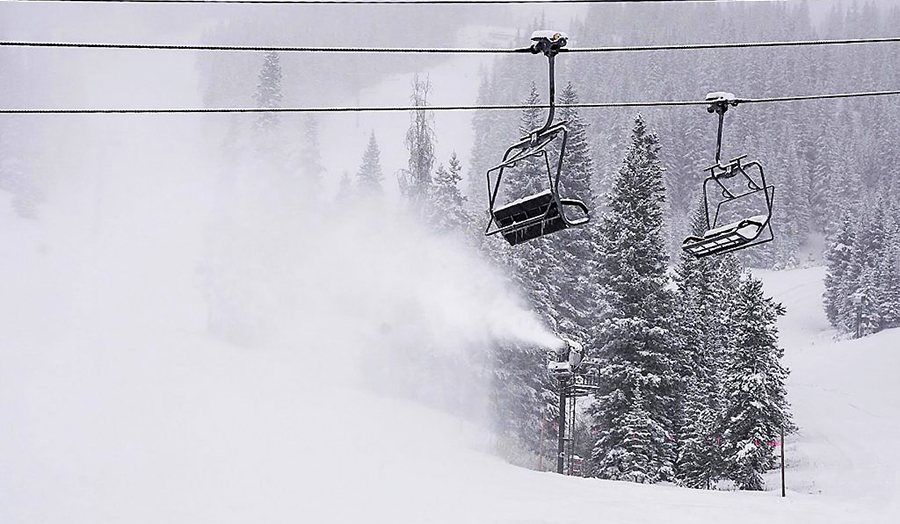Vail Resorts, Inc. reported that season-to-date (STD) total skier visits decreased 9.7 percent, and total lift revenue increased 2.6 percent through March 3, 2024 compared to the fiscal year 2023 season-to-date period through March 5, 2023. Season-to-date ski school revenue was up 5.5 percent, and dining revenue was down 0.5 percent compared to the prior year season-to-date period. Retail/rental revenue for North American resort and ski area store locations was down 9.3 percent compared to the prior year season-to-date period.
“Given the unfavorable conditions across our North American resorts, we are pleased that our results for the quarter demonstrate the resiliency of our strategic business model and our network of resorts and loyal guests,” offered Kirsten Lynch, CEO of Vail Resorts, Inc. “The results for the second quarter were negatively impacted by challenging conditions at all of our North American resorts, with approximately 42 percent lower snowfall across our western North American resorts through January compared to the prior-year comparable quarter and limited natural snow and variable temperatures at our Eastern U.S. resorts (comprising the Midwest, Mid-Atlantic, and Northeast).
She continued, “While visitation declined, our ancillary businesses performed well, in particular our ski and ride school, dining and rental businesses experienced strong growth in spending per visit compared to the prior year. We are pleased with the strong execution across our mountain resorts, as well as the impact of the Company’s investments in our employees, technology, and on-mountain experience.”
Mountain Segment
Total lift revenue increased 1.8 percent to $603.5 million for the fiscal second quarter ended January 31, 2024, compared to the prior-year comparable quarter. The increase was said to be primarily due to an increase in North American pass product revenue, which increased 8.3 percent due to an increase in pass product sales for the 2023/24 North American ski season compared to the prior year.
Pass product revenue, although primarily collected before the ski season, is recognized in the Consolidated Condensed Statements of Operations throughout the ski season on a straight-line basis using the skiable days of the STD period relative to the total estimated skiable days. Challenging conditions during the early portion of the 2023/2024 North American ski season resulted in delayed openings for a number of the company’s resorts and, as a result, it expects to recognize approximately $14 million of pass product revenue during the three months ending April 30, 2024, that would have otherwise been recognized during the three months ended January 31, 2024. Additionally, non-pass product lift revenue decreased 13.1 percent, reportedly driven by a decrease in skier visitation across all regions, which was impacted by limited natural snow and variable temperatures that resulted in delayed openings and reduced terrain offerings as compared to the prior year and particularly impacted resorts in the Eastern U.S. and Tahoe, partially offset by an increase in non-pass Effective Ticket Price (ETP) of 10.8 percent.
Ski school revenue increased 2.6 percent for the quarter, primarily driven by increased revenue at resorts in Colorado and Park City, which benefited from increased guest spending per visit.
Dining revenue decreased 4.4 percent, primarily due to decreased revenue from on-mountain dining venues at resorts in the Eastern U.S. and Tahoe, partially offset by an increase in guest spending per visit.
Retail/rental revenue decreased 14.9 percent for fiscal Q2, for which retail sales decreased 17.2 percent and rental sales decreased 11.6 percent. The decrease in both retail and rental revenue was said to be primarily driven by a decrease in skier visitation, as well as the company’s exit of certain leased store operations that were operated in the prior year and resulted in a reduction in revenue of approximately $8.4 million.
Operating expense decreased $35.6 million, or 5.8 percent, which was said to be primarily attributable to reduced labor hours at the North American resorts as a result of challenging early season weather conditions, including limited natural snow and variable temperatures that resulted in delayed openings and reduced terrain offerings which impacted the company’s ability to operate at full capacity, as compared to the prior year, as well as lower variable expenses associated with decreased revenue, and disciplined cost management.
Mountain Segment Reported EBITDA increased $21.5 million, or 5.4 percent, for the second quarter compared to the prior-year comparable quarter, which includes $6.3 million of stock-based compensation expense for the three months ended January 31, 2024, compared to $5.7 million in the prior-year comparable quarter.
Lodging Segment
Lodging segment net revenue (excluding payroll cost reimbursements) for the fiscal second quarter decreased 3.0 percent, reportedly driven primarily by a decrease in revenue from managed condominium rooms of $3.0 million, or 9.7 percent, as a result of decreased demand, including the impact of decreased skier visitation driven by challenging weather conditions, as well as a reduction in our inventory of available managed condominium rooms proximate to our mountain resorts.
Operating expense (excluding reimbursed payroll costs) decreased $11.0 million, or 13.8 percent, which was primarily attributable to a reduction in labor hours associated with decreased demand, as well as lower staffing required to support a reduced inventory of managed condominium rooms; a decrease in allocated corporate overhead costs; and the receipt of property tax refunds during the quarter.
Lodging Reported EBITDA increased $8.8 million, or 216.1 percent, for the second quarter compared to the prior-year comparable quarter, which includes $0.9 million of stock-based compensation expense for the three months ended January 31, 2024, compared to $1.1 million in the prior-year comparable quarter.
Resort – Combination of Mountain and Lodging Segments
Resort net revenue decreased 1.5 percent year-over-year to $1.08 billion for the fiscal second quarter.
Resort Reported EBITDA was $425.0 million for the second quarter, an increase of $30.2 million, or 7.7 percent, compared to the prior-year comparable quarter, which includes $2.1 million of acquisition-related expenses for the second quarter of fiscal 2024 compared to $0.3 million of acquisition and integration related expenses in the second quarter of the prior year.
Total Performance
Total net revenue decreased $23.8 million, or 2.2 percent, year-over-year to $1.08 billion for the fiscal second quarter..
Net income attributable to Vail Resorts, Inc. was $219.3 million, or $5.76 per diluted share, for the second quarter of fiscal 2024, compared to the net income attributable to Vail Resorts, Inc. of $208.7 million, or $5.16 per diluted share, in the second quarter of the prior year. Additionally, net income for the second quarter of fiscal 2024 includes the after-tax effect of acquisition-related expenses of approximately $1.6 million, compared to $0.2 million of acquisition and integration-related expenses in the second quarter of the prior year.
Outlook
The company updated its guidance for fiscal year 2024 and is now expecting net income attributable to Vail Resorts, Inc. to be between $270 million and $325 million and Resort Reported EBITDA to be between $849 million and $885 million, which includes an estimated $4 million of acquisition-related expenses specific to Crans-Montana.
Image courtesy Vail Resorts. Inc.
















